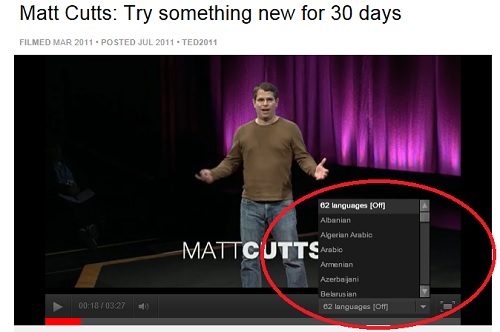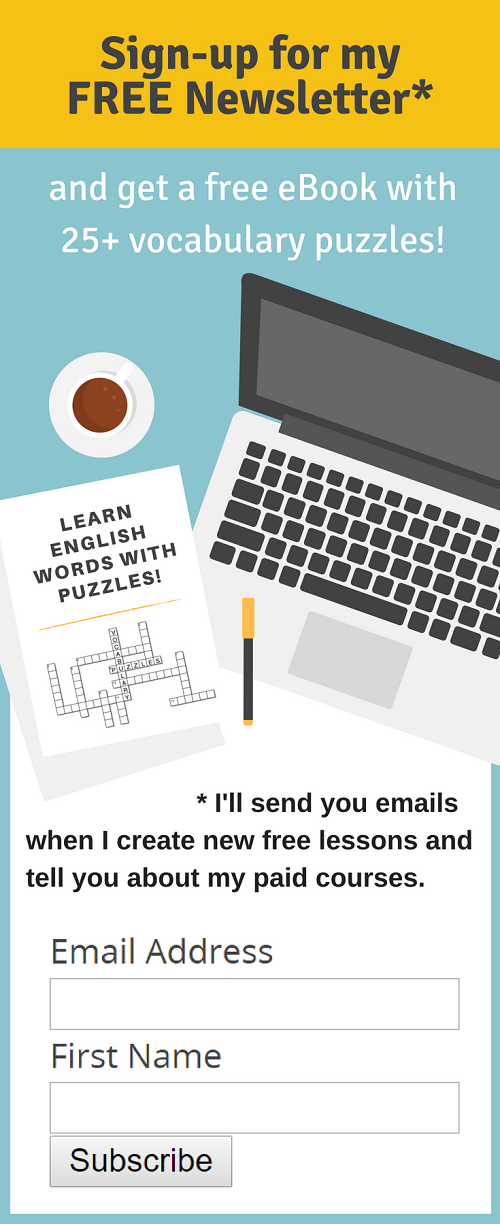TED Talk Transcript
Matt Cutts: Try Something New for 30 Days
The transcript of this TED talk is provided below as well as instructions for how you can watch the video with subtitles. This can be helpful for understanding the video, practicing listening comprehension and learning new words as well.
The video is provided here again with English subtitles. (See below for how to turn on subtitles in your own language if they are available).
Transcript:
Matt Cutts:
A few years ago, I felt like I was stuck in a rut, so I decided to follow in the footsteps of the great American philosopher, Morgan Spurlock, and try something new for 30 days.
The idea is actually pretty simple.
Think about something you've always wanted to add to your life and try it for the next 30 days. It turns out, 30 days is just about the right amount of time to add a new habit or subtract a habit -- like watching the news -- from your life.
There's a few things I learned while doing these 30-day challenges.
The first was, instead of the months flying by, forgotten, the time was much more memorable. This was part of a challenge I did to take a picture every day for a month. And I remember exactly where I was and what I was doing that day.
I also noticed that as I started to do more and harder 30-day challenges, my self-confidence grew. I went from desk-dwelling computer nerd to the kind of guy who bikes to work -- for fun.
Even last year, I ended up hiking up Mt. Kilimanjaro, the highest mountain in Africa. I would never have been that adventurous before I started my 30-day challenges.
I also figured out that if you really want something badly enough, you can do anything for 30 days.
Have you ever wanted to write a novel? Every November, tens of thousands of people try to write their own 50,000-word novel from scratch in 30 days. It turns out, all you have to do is write 1,667 words a day for a month. So I did.
By the way, the secret is not to go to sleep until you've written your words for the day. You might be sleep-deprived, but you'll finish your novel. Now is my book the next great American novel? No. I wrote it in a month. It's awful.
But for the rest of my life, if I meet John Hodgman at a TED party, I don't have to say, "I'm a computer scientist." No, no, if I want to, I can say, "I'm a novelist." (Laughter)
So here's one last thing I'd like to mention. I learned that when I made small, sustainable changes, things I could keep doing, they were more likely to stick. There's nothing wrong with big, crazy challenges. In fact, they're a ton of fun. But they're less likely to stick.
When I gave up sugar for 30 days, day 31 looked like this. (Laughter)
So here's my question to you: What are you waiting for? I guarantee you the next 30 days are going to pass whether you like it or not, so why not think about something you have always wanted to try and give it a shot for the next 30 days.
Thanks.
Definitions of some phrases and words from this talk
stuck in a rut: to be too fixed (and possibly bored) in a particular type of job, activity or situation to change to something else.
- A few years ago, I felt like I was stuck in a rut.
to follow in the footsteps of: to do the same thing as someone else did before.
- A few years ago, I decided to follow in the footsteps of the great American philosopher, Morgan Spurlock.
flying by: to go by very quickly (as if by flying)
- Instead of the months flying by, forgotten, the time was much more memorable.
desk-dwelling: a dwelling is a house or a place to live in. People spend so much time sitting at their desks in their offices, it's like their second home.
(He's always at his computer working, like a computer nerd = someone who likes computers and technical things and doesn't have great social skills).
- I went from desk-dwelling computer nerd to the kind of guy who bikes to work -- for fun.
to end-up: to finally be in a particular place or situation.
- I ended up hiking up Mt. Kilimanjaro.
to figure out: to understand something/someone or to find the solution to a problem after thinking about it a lot.
- I also figured out that if you really want something badly enough, you can do anything for 30 days.
from scratch: from the beginning without using things that already exist.
- Tens of thousands of people try to write their own 50,000-word novel from scratch in 30 days
it turns out: to happen in a particular way or to have a particular result, especially an unexpected one.
- It turns out, all you have to do is write 1,667 words a day for a month.
by the way: this phrases introduces a new subject or is used to give additional information.
- By the way, the secret is not to go to sleep until you've written your words for the day.
to stick: to stay or to remain in place.
give it a shot: to try something.
- So why not think about something you have always wanted to try and give it a shot for the next 30 days?
Now you can take the quiz to see if you can remember some of these phrases.
How to view the subtitles (with translations in your language)
At the lower right-hand of the screen there is a drop-down menu that allows you to turn on subtitles (see screen shot below). Most TED talks have a number of different languages available in addition to English. This can help you understand parts of the video you didn't understand and/or help you to learn new vocabulary words more quickly.

Return to Matt Cutt's TED Talk page.
